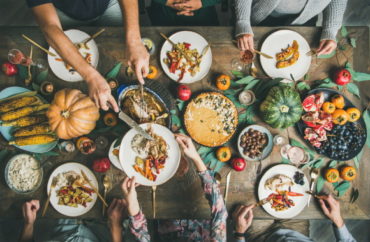
A medical doctor and professor at the University of California San Francisco implored his peers to stop scolding people for wanting to celebrate Thanksgiving.
Vinay Prasad said that an abstinence-only approach to Thanksgiving is a problematic one and that doctors need to address coronavirus safety issues with nuance and understanding. Prasad explained his approach in an op-ed for MedPage Today.
He criticized his peers for tweeting critical messages in response to an Ohio State University survey that found 38 percent of people planned to celebrate Thanksgiving with more than 10 people.
“Public health experts and doctors pointed to rising COVID-19 case numbers in many states and scolded (often in all caps): DO NOT HAVE THANKSGIVING,” Prasad said.
This is a problematic approach, Prasad said.
“I worry that the abstinence-only approach — the just-don’t-have-Thanksgiving approach — is not the right way for public health experts to respond,” he said.
MORE: Experts warn universities not to berate students for coronavirus violations
The oncologist and medical professor explained further:
First, I take the poll seriously. I do not doubt that many Americans strongly desire to gather for Thanksgiving. If anything, I worry the poll is an underestimate, as people are often reluctant to divulge socially unacceptable desires.
Second, I think public health experts should not just listen, but hear what people are saying. Americans are saying that despite all the damage done by COVID-19, despite the rising cases and at-capacity ICUs around the country, their desire for human connection is so great, that they are willing to take the risk and have Thanksgiving. Americans are, in effect, expressing the longing and desperation of their soul.
And, who can blame them? Human beings desire water, food, sleep, sex, and social connections, and not necessarily in that order. It is natural and expected that, after a hard year, people will crave the normalcy and social connections of Thanksgiving. So much so that they are even willing to take risks.
Prasad explained that mitigation, not prohibition, is a healthier approach.
“Given that the desire is so strong, what advice can we give to minimize the risk? How can we reduce — not eliminate risk,” Prasad asked.
MORE: Do not let so-called public health experts ruin your Thanksgiving
The no-guests policy advocated by some could even backfire.
Prasad said:
The truth of public health is that it is a service industry; it is not meant to imprison, but to empower. The reality is that minimizing risk is also often the prudent strategy. It can lead to the greatest success. An abstinence-only message might mean people defy you, spend more time indoors (to avoid being judged), and end up spreading the virus far more than if you gave them safer options. In an effort to aim for perfect, we end up doing a worse job than had we lowered our ambition from the outset.
He concluded by taking doctors to task for giving in to the social media frenzy of retweets and likes.
“Starting with compassion, and thinking of ways they can meet, but as safely as possible, is the task of real public health,” Prasad said.
“Now is the time to save public health from social media,” the medical professor said.
IMAGE: Foxys Forest Manufacture /Shutterstock
Like The College Fix on Facebook / Follow us on Twitter




Add to the Discussion